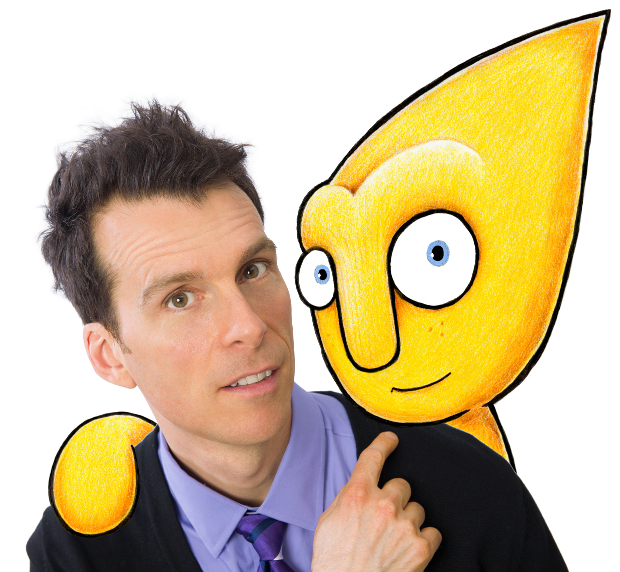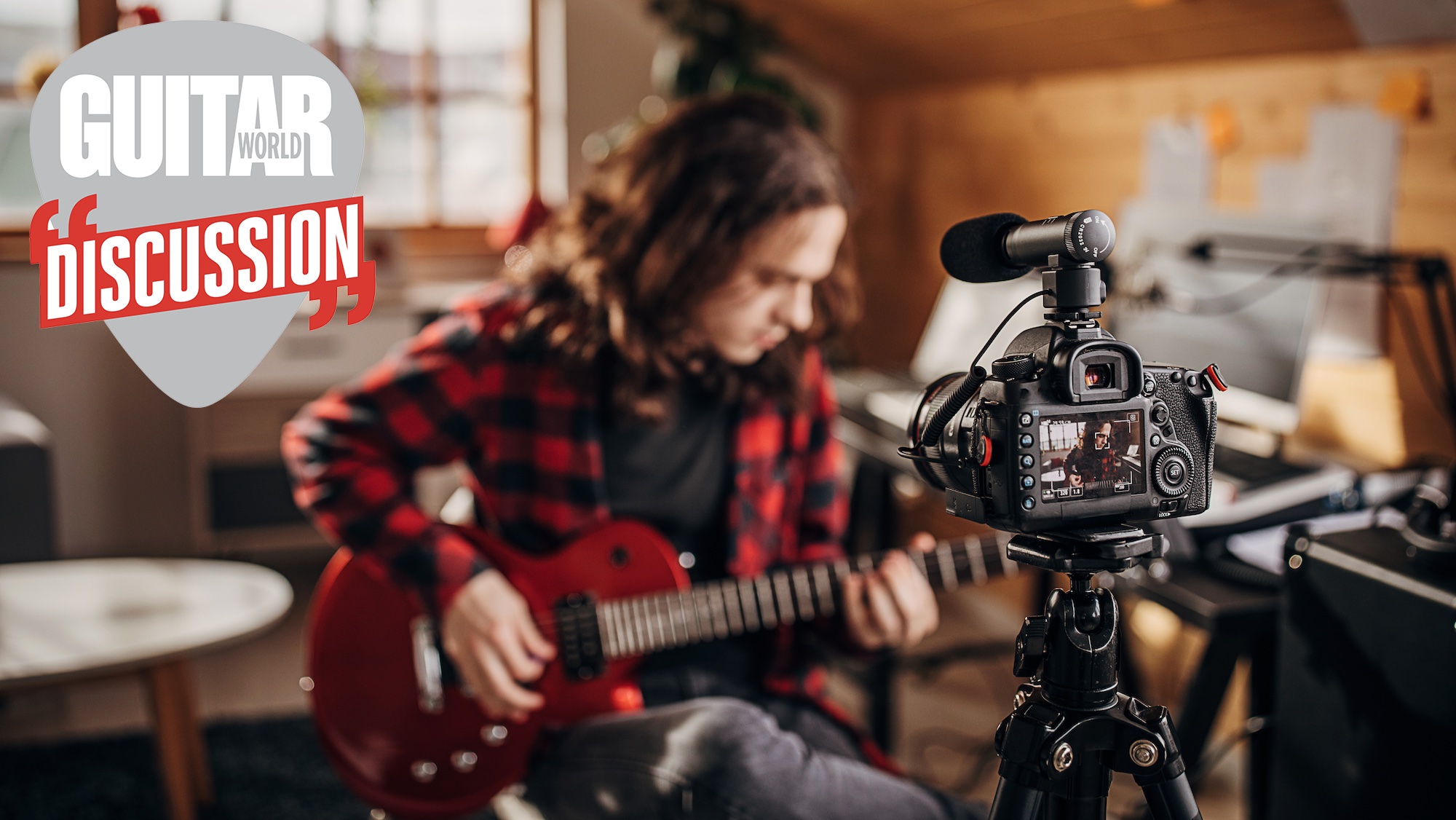Songcraft: Morgan Taylor on All-Ages Songwriting, His Alter-Ego Gustafer Yellowgold and 'Dark Pie Concerns'
All the latest guitar news, interviews, lessons, reviews, deals and more, direct to your inbox!
You are now subscribed
Your newsletter sign-up was successful

Described by The New York Times as "a cross between Yellow Submarine and Dr. Seuss," the work of singer-songwriter-illustrator Morgan Taylor is just that; super catchy, literate and whimsical—a slightly trippy, pop art confection for the eyes and the ears.
Beginning his musical career as a teen in the Eighties, Taylor has had a long and varied sonic history playing in various bands, working as a solo artist and sharing bills with the likes of Bob Dylan, Wilco, the Polyphonic Spree and many more.
In 2004, Morgan, a self-taught illustrator, casually began drawing a picture book project that would later serve as inspiration for the visual side of his “Gustafer Yellowgold” all-ages, music video series.
I caught up with the Ohio-born, New York-based Taylor on the eve of his new, multi-media release, Dark Pie Concerns. It's the latest installment in the aforementioned "Yellowgold" DVD/CD cycle, featuring words, music and moving images all crafted by Taylor himself. Morgan and I talk songwriting, all-ages music and, of course, pie.
GUITAR WORLD: From a songwriting standpoint, do you think there's much of a difference between crafting straight-up, "adult" pop music as opposed to writing for the all-ages genre? It seems you've successfully blurred the line between the two worlds.
My foremost mission is to prove you don't have to sacrifice your own musical tastes to enjoy music with your children. I find it aggravating, but understandable, that the moment you say the “C word” (Children’s), a huge gate slams down because the instant, mainstream associations are so negative for so many. I really hope I can change that, or at least help.
What I’ve been doing is creating music for parents who grew up on late-Seventies pop, Eighties MTV and the alternative music revolution, then spent the Nineties in bars going to see original alternative pop music. (Oh, yeah! That’s ME). Most of those folks have children now but still have the same tastes in music. Just because you choose to procreate doesn’t suddenly mean you have to bring music into your home that you wouldn’t have otherwise enjoyed. There are way more options now. For me, the only difference is the lyrics. And sometimes, barely so.
All the latest guitar news, interviews, lessons, reviews, deals and more, direct to your inbox!
Here’s the great irony: it wasn’t until I started putting my cartoon illustrations with my alt-pop music that I got to do things like open for Wilco or the Polyphonic Spree. What happened was I accidentally found a newer/truer voice. As soon as I started thinking of things from the angle of guys like Jim Henson or Dr. Seuss, as opposed to Radiohead or the Strokes, my career actually began. All the ingredients; true pop songwriting, humor and now the element of adding my offbeat, colored pencil videos—it made me stand out enough that people started reacting very positively. My lyrics were still referencing mortality and things that people hadn’t heard in the genre before.
Obviously, your "Gustafer Yellowgold" work has a very strong visual component—character illustrations, animation, etc. Does the visual aspect of things influence the songwriting or is it the other way around?
Well, when I created my first album/DVD, I was strictly using the songs I’d written during my first couple of years in the downtown New York City music scene; 1999 to 2001. I worked as a sound engineer at a small club on the Lower East Side. I had an amazing outpouring of creativity, stimulated by this songwriter scene-immersion, and I had a surplus of material I wasn’t using in my band at the time. Those particularly whimsical songs got sifted out and became the basis for the “Gustafer Yellowgold” project. There was no pretense of an audience, demographic or anything. I was really writing them to get a giggle out of my bandmates and to take liberty with my own freak flag, I guess.
Essence-wise you could say along the lines of Ween, They Might Be Giants or XTC there was an oddness lyrically, but the music and craft was taken seriously. Just not as dark perhaps as the tunes I was using for my "real band." Songs like “I’m from the Sun,” “Pterodactyl Tuxedo” and “Tiny Purple Moon” just set the stage for these characters. Going forward from that point, I began writing with the characters in mind.
When you're not on the road touring your live show or at the drafting table illustrating the visual end of the work, what does a typical songwriting session of yours look like? Can you walk us through your process?
Much of the time when I’m writing, I do have a vague notion of what might be happening in the animated video that will accompany it. It usually starts with either a song title that inspires a concept, or a kernel of a guitar progression/melody that comes around.
What will usually happen is I’ll begin noodling, improvising a guitar figure on my acoustic guitar, and if I feel any intrigue, a melody will sort of just appear and I’ll sing some mumbly words, and it starts building. I record it onto my voice memo on my phone as soon as possible because usually the kids are in the house and I know I could be distracted away at any moment. So in a way, I feel I’m stealing a bit of time for this moment, and the pressure sometimes adds to the urgency in a useful way. So many of my voice memos in the past seven years have the boys' voices in the background, playing, talking, yelling... I’ve accumulated these throughout the years and its fun to listen back and hear how young the sounds are from the kids in the background. It makes a little time capsule out of the song’s inception in a way.
If I have what I feel are strong parts, at least verse/chorus, I’ll keep recording new voice memos as the song grows. Maybe a bridge will pop out later and I’ll record that on its own, and label it accordingly. If the song shows itself as ‘worth finishing’ then I’ll make a word document and type out the lyrics like a piece of poetry, trimming fat out, removing unnecessary personal pronouns and making sure the turns of phrase seem fresh… stuff like that. Somehow seeing it laid out on the page in an ‘official’ state helps me with this polishing process.
Lastly, I think we’ve all had a few dark pies in our lives, but for the uninitiated, what exactly is "Dark Pie" and should they be concerned?
Ha! Yes, they should. The song “Dark Pie” can be taken literally or metaphorically. The protagonist in this song is trapped in a Groundhog Day loop of pie burning, and the music is definitely inspired by some late-Seventies disco era with a little ELO and Bee Gees thrown in.
It’s also about knowing when to ask for help. On a deeper level you could say it’s ultimately a song about suffering, in the sense that sometimes being able to help yourself is the actual problem, and what or whom you burn in the process is the trouble you’ve caused. The cause for concern!
I named the CD/DVD Dark Pie Concerns because I generally enjoy wordplay and confusing sounding titles. This one has an oddness of tracing the syllabic and vowel form from “Dark Knight Returns.” I love titles that make you have to look twice and think, “What the hell does that mean?”
Gustafer Yellowgold's Dark Pie Concerns is available now. To learn more about Morgan Taylor and his work, visit gustaferyellowgold.com.
Photo: Dion OgustMark Bacino is a singer/songwriter based in New York City. When not crafting his own melodic brand of retro-pop, Mark can be found producing fellow artists or composing for television/advertising via his Queens English Recording Co. Mark also is the founder/curator of intro.verse.chorus, a website dedicated to exploring the art of songwriting. Visit Mark on Facebook or follow him on Twitter.
